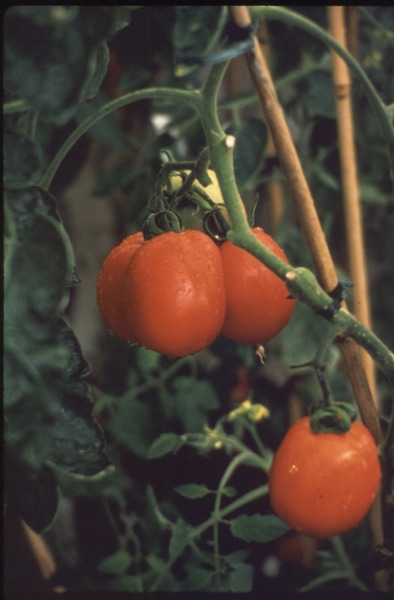
Field tomato growers from Texas to Florida say a new virus-resistant tomato variety developed by vegetable breeders at Texas A&M University may provide a glimmer of hope for an industry that has been decimated by a raging virus complex spread by the dreaded whitefly, an outbreak so intense that it has destroyed virtually all field tomato production in the vegetable-rich Rio Grande Valley and has challenged growers from Arizona to Florida who have been losing ground to Canadian and Mexican tomato imports in recent years.
“Research on the development of the T-5 tomato variety came about as a result of a need for a tomato that could stand up to a new virus strain spread by whiteflies into warm climate areas of the U.S. back around 2002,” says Dr. Kevin Crosby, a vegetable breeder and member of the Vegetable and Fruit Improvement Center at Texas A&M.
“This new strain of viruses decimated South Texas tomatoes to the point that growers largely abandoned once very successful operations, opening the door for exported tomatoes from across the border.”
Crosby says the new virus strain originated in the Middle East and spread from Florida to Mexico and came back to Texas by whiteflies. Once the plants were infected with the virus, leaves would turn yellow and curl, eventually killing the plant at early stages of development. In the Rio Grande Valley, nearly 40,000 acres of field tomato production have fallen victim to the virus.
Ray Prewett, Executive Vice-President of the Texas Vegetable Association in Mission, says the Valley has a rich history of commercial tomato production.
“What most people don’t realize is that at one time there were as many as 100 cannery operations in the Valley, so much so that at one time growers in the Valley boasted of feeding America’s soldiers in World War II,” Prewett said. “And that is largely true. The canneries mass-produced long shelf life food products that were carried into Europe and the Pacific regions and many soldiers survived by eating these products.”
By the end of the last century the number of canneries had declined, but the Valley remained a viable growing region for tomatoes and processing operations until early last decade when the new virus strain arrived.
“And it’s not just the Southwest that has struggled with the whitefly and this new virus complex. Florida growers have been battling the disease for over a decade and they also have suffered declining production numbers as a result, and Arizona growers are now dealing with the whitefly and virus problems as well,” Crosby adds.
He says while the T-5 variety is a Roma type tomato used largely in canning operations, research is already underway to develop a virus resistant strain of Beef Steak tomatoes, and an added benefit to the new variety is not only its virus-resistant properties, but they are also more heat tolerant for drier regions.
“This is wonderful news, a tomato that is virus resistant to whitefly infestations and more heat tolerant in the field. This is awesome news for field tomato growers looking for a way to increase their yields and lower their production costs,” said Dr. Juan Anciso, a Texas AgriLife Extension Service vegetable specialist in Welsaco. “There are only a handful of tomato guys left in South Texas and already we know of one large producer who is using the T-5. This is good news for the vegetable industry.”
In addition to its virus resistance and heat tolerance, breeders say the T-5 has sparked a lot of interest because it is an open pollinated variety, meaning it doesn’t require a hybrid seed. This means a lower cost seed and one that allows for direct seeding in the field.
Field trials continue across Texas and at least one commercial breeder is already testing the variety in production. Buddy Ault, president of Rio Valley Canning in Donna, says so far he is pleased with the results.
“The tomato has good color and taste and is highly productive,” Ault says.
The only down side he’s seen is that the T-5 is an indeterminate variety, so not all the fruit sets and matures at the same time. But he’s hopeful the next generation of the new variety may incorporate improvements to make it even more attractive to commercial growers.
“We’re certainly pleased with Dr. Crosby’s new variety,” Ault adds.
About the Author(s)
You May Also Like






